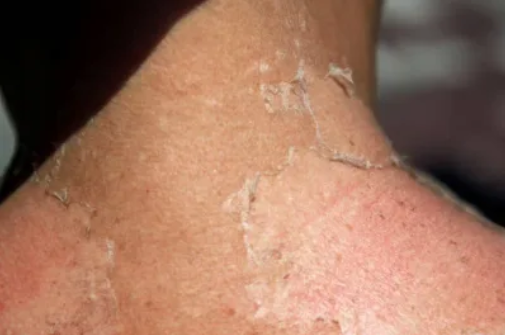As we embrace the warmer months and spend more time outdoors, it’s crucial to recognize that the sun, while a vital heat source, also poses a significant threat to our skin. It is therefore essential to protect our skin from the harmful effects of the sun. This is especially true for the many people eager to sunbathe for that enviable tan.
Sun Damages: A scientific closer look
Understanding the science behind sun damages is key to preventing and treating the consequences, ensuring healthier and more vibrant skin for years to come.
Sun damages occur primarily due to excessive exposure to harmful ultraviolet (UV) radiation, composed of UVA and UVB rays. UVA rays penetrate deep into the dermis, resulting in premature aging, fine lines, and wrinkles, while UVB rays cause sunburns and contribute to the development of skin cancer, including melanoma.

Long-Term Implications for Skin Health:
The long-term implications of sun damages cannot be underestimated. According to the American Academy of Dermatology, approximately one in five Americans will develop skin cancer in their lifetime, with an estimated one person dying every hour from melanoma. Moreover, a study published in the Journal of Investigative Dermatology suggests that 80% of visible aging signs can be attributed to UV exposure.
Rejuvenating Your Skin: Treating Sun Damages
If you’re already experiencing the effects of sun damages, there is hope. Innovative treatments such as chemical peels, microdermabrasion, and laser therapy can help reverse some of the visible signs of damage. Consult a dermatologist, who can tailor a treatment plan based on your individual needs.

Prevention is Key:
To protect your skin from sun damage, experts advise taking a multi-faceted approach.
- Seek shade during peak sun hours (10 a.m. to 4 p.m.),
- wear protective clothing. Wear a hat, sunglasses to protect your eyes.
- These precautions are all the more crucial for children whose skin is more delicate and for the elderly who are much more sensitive.
- Remember that even on cloudy days, harmful UV rays can penetrate the clouds. Do not hesitate to take a parasol when you go to the beach.
Stay hydrated:
Hydrating your body from within is essential for maintaining healthy, glowing skin that is resistant to sun damage. The sun can dry out the skin and expose it to risks such as premature aging, wrinkles, sagging skin and even certain skin diseases.
Drinking enough water is the first step to keeping your skin hydrated from the inside out. Every day our bodies lose water through sweating and evaporation, and in hot weather this loss can be even greater. Therefore, it is recommended to drink at least 8 glasses of water a day in order to maintain an optimal level of hydration.
Fresh juices, smoothies or herbal teas can also be very beneficial. Fruits and vegetables are rich in vitamins, minerals and antioxidants that help strengthen the skin and protect it from UV damage. Citrus fruits, such as oranges and lemons, are particularly recommended because they are rich in vitamin C, which helps stimulate the production of collagen, essential for healthy and elastic skin.
Be careful, alcohol has a dehydrating effect on the body and can aggravate the harmful effects of the sun.

Actionable Tips for Sun Protection:
Hydration is vital. By keeping your skin moisturized, you create a barrier of defense against sun damages. Always apply a broad-spectrum sunscreen with an SPF of 30 or higher. And, coat yourself with water proof cream if you go to the sea
Recommended Products:
- Sunscreens: Look for brands like Neutrogena, La Roche-Posay, and EltaMD, which offer broad-spectrum protection and are recommended by dermatologists.
- Moisturizers: Opt for products containing hyaluronic acid, vitamin C, and niacinamide to replenish and repair your skin.
Naturally Preventing Sun Damage:
While sunscreen is essential, incorporating natural remedies into our daily routines can further enhance our defense against sun damage.
Consider incorporating aloe vera gel, green tea, and coconut oil into your skincare routine. These ingredients possess anti-inflammatory and healing properties.
- Green Tea Extract:
Green tea extract is known for its potent antioxidant properties, making it an excellent natural remedy for preventing sun damage. Studies have shown that applying a green tea extract topically can reduce inflammation and UV-induced skin damage. Furthermore, the polyphenols present in green tea can protect against collagen breakdown, providing anti-aging benefits.
Preparation and Usage:
- Steep a green tea bag or loose leaf tea in hot water for 5-10 minutes.
- Let the tea cool down completely.
- Apply the cooled green tea extract on exposed skin using a cotton ball.
- Repeat this process twice a day, especially before prolonged sun exposure.
Precautions:
Those with sensitive skin may want to test the green tea extract on a small patch of skin beforehand, as some individuals may experience slight irritation. Additionally, it’s important to note that green tea extract is not a substitute for sunscreen but rather a complementary measure.

- Aloe Vera:
Aloe vera, with its soothing and cooling properties, has been traditionally used for sunburn relief. Recent scientific studies have shown that aloe vera gel can reduce UV-induced inflammation, speed up wound healing, and enhance the skin’s natural protective barrier.
Preparation and Usage:
- Cut an aloe vera leaf and collect the gel by scooping it out.
- Apply the gel directly to the skin and gently massage until absorbed.
- Repeat this process as needed, especially after sun exposure or in case of sunburn.
Precautions:
Although aloe vera is generally safe for most individuals, some may experience an allergic reaction. It’s advisable to perform a patch test on a small area of skin before applying it to larger areas.

A good diet for your skin:
- Antioxidant-rich foods like berries, leafy greens, and dark chocolate can help neutralize free radicals caused by sun exposure.
- Carotenoid-Rich Foods:
Certain colorful fruits and vegetables, high in carotenoids such as beta-carotene, lycopene, and lutein, offer natural protection against the sun’s harmful rays. Carotenoid-rich foods can neutralize free radicals, reduce sunburn, and improve the skin’s resistance to UV damage.
Examples of carotenoid-rich foods: carrots, tomatoes, spinach, sweet potatoes, red peppers.
Incorporation into Diet:
- Include these foods in your daily diet to ensure a steady supply of carotenoids.
- Opt for raw or minimally cooked preparations to maximize their nutritional benefits.
- Pair them with a healthy fat source, like olive oil, to enhance nutrient absorption.
Precautions:
While carotenoid-rich foods can support sun protection, they should not replace sunscreen or other sun-protective measures. These remedies work best when incorporated into a comprehensive approach to sun protection.
Don’t let the sun rob you of your skin’s radiance. By understanding the science behind sun damages, taking preventive measures, and seeking appropriate treatments, you can safeguard your skin from the adverse effects of sun exposure. Remember, investing in your skin today will ensure a healthier tomorrow. So, embrace sun protection, cherish your skin, and be the guardian of your own beauty.

